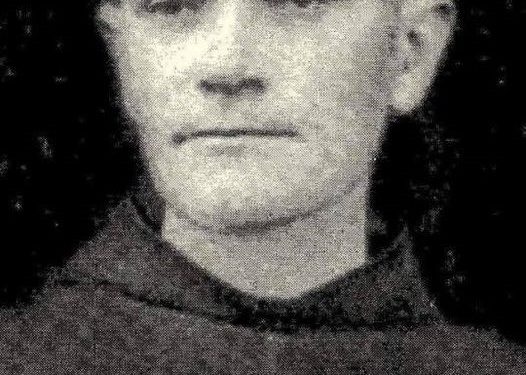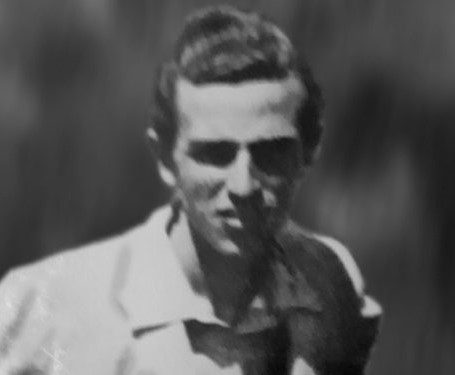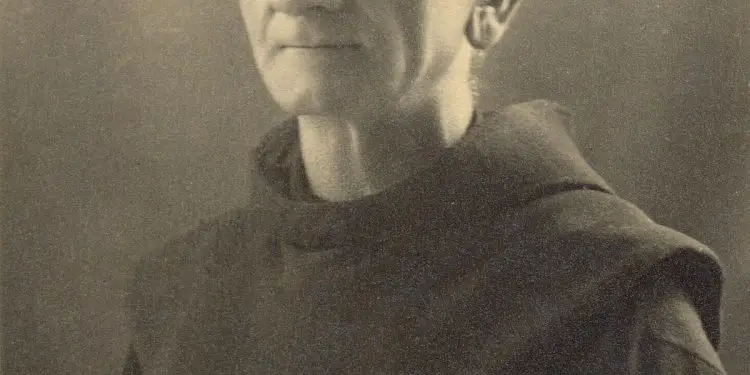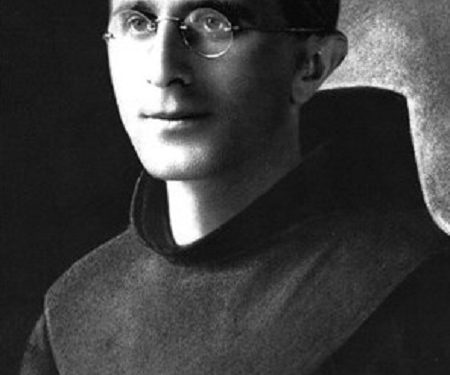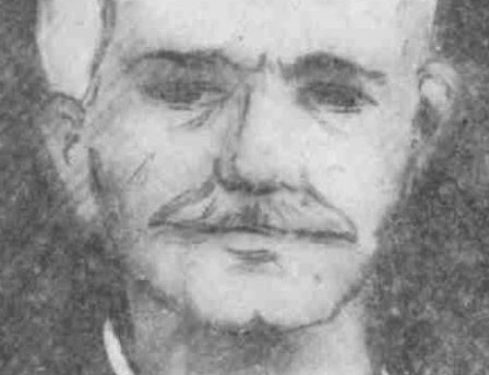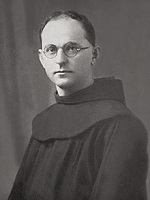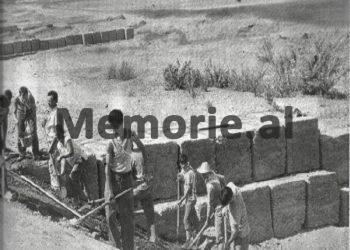From Veli Haklaj
The third part
PERSECUTION OF THE CATHOLIC CLERGY – STATE SECURITY QUESTIONS IN 1946
Memorie.al / In the history of the Albanian nation, the Catholic Church has played an important and often precious role. Unfortunately, the relationship that the communist government built in Albania, with the faith as a whole, resulted in an unprecedented wave of repression against clerics of all faiths in our country, especially against the spiritual leaders of the Catholic faithful. According to the determination made by Monsignor Rrok Mirdita: “Regardless of the gigantic strength with which the church has carried the weight of the national culture, regardless of the unbearable light it has cast on the shadows of our old and new history, regardless of the spirit of sacrifice that has accompanied her life in our country, even for these very reasons, many attacks have been launched against the Catholic Church in Albania, and one of the most terrible was the communist one, which together with the process of physical disappearance of the most vocal Catholics, staged the process of distortion of history, on the relations of the Catholic Church with Albania”.
Continues from last issue
FATHER FRANO KIRI AND FATHER CIRIL CANI ARE QUESTIONED
Minutes of Father Frano Kiri’s questioning
After the conversation, Sulço’s son came back, and after a while Dukagjini started to write ballista in Shkodër. So the decision that Dukagjini had made, not to approach (force) with the exception of the parties, which he continues to not approach until the end which came with war, was broken.
In July 1944, I was in Tirana and two people from Dukagjin, Vat Gjoni and Mark Sadiku, came here, who begged me to get them ammunition from the Germans. Then I agreed with Father Anton Harapin, who gave me a letter to the German command, to withdraw twenty boxes of cartridges, nine of which Lik Marashi would take, and I took one, which I distributed to the villagers of Cyrus.
I have worked against the National Liberation Movement as an individual, but I have never done organized work and it is not true that in Dukagjin I was sent on a mission by the Clergy to organize the people against the National Liberation Movement of Albania, nationally I have I expected it well, but as a regime I expected it badly, because it was known that there was a communist party inside.
Father Gjon Shllaku told me in October 1945, that a high authority came from Tirana, who spoke about free elections, that’s why we should form Demokristianen. In this case, I told him, don’t bother with this work, and we parted and never talked, until I was arrested.
A few days before the elections, Gjelosh Luli came with someone from Tirana, whose name I do not know. We left him at the Assembly of Arra e Madhe and he met me. He told me about the “Albanian Union” and then he told me that they elected him as its president, as well as one or two meetings that they had at the Jesuit Seminary with some friends, such as with Mark Çunin, Gjon Shllak, etc. After these words, I told him that you should leave, that the government will dictate to you and you will kill yourself.
With Gjenarin Topalli and Ndrek Kakarriq, I talked about Demokristiana in Albania and that it could be used against the elections. Then I told them that this is not done, but only the idea should continue, because it is good.
In October 1945, I went to the Bishop, Monsignor Thaçi, where we talked about Demokristiane, who gave me neither yes nor no consent. In my opinion, Demokristiania is the offspring of “Catholic Action”, since “Catholic Action” could not be presented openly as a political party, hence Demokristiania was formed.
Fugitive Mark Mala has written to me twice and I have answered his letters. He sent the letters to me in Shkodër, with a guy from Dukagjini, whose name I don’t know. In the letters he complained to me that he was very sick, and then he asked me if there was any new news. In this case, I have written about the Peace Conference, as well as that of the U.N.O.S.
Then I wrote to him so that he does not despair, that who knows how the work is done and I have orders, not to take the people by the neck, etc. I sent them four hundred Albanian francs to Berat, since they were in exile here.
By the mountaineer whom I said above, I have sent Mark a great coat, and I know not that I have given him any other assistance, both to Mark and to his family. It is not true that I wrote to Mark to stay on the mountain and organize other companions, and it is also not true that I sent help to other fugitives, as I am accused.
I don’t know anything about the Postriba movement except that, when the guns fell, I found out and I don’t even know that such work was organized, after the appearance of the “Albanian Union” organization.
Record of interrogation of Father CIRIL CANIT
On February 27, 1947, in the Office of the State Security Section, Shkodër, in the presence of Captain Zoi Shkurti, with the secretary of this section, Fadil Rexhepi, being present, Father Ciril Cani, of the deceased Pashko and Lules, was questioned. born in 1875, born in Shkodër and resident at that time in Bajzë i Kastrat, sub-prefecture of Koplik, Ivanaj neighborhood, permanent resident in Shkodër, dependent on the Province, Albanian citizenship and nationality, middle class, priest by profession, unmarried and childless, who declared:
In 1890, together with twenty others, we went to Austria’s Bosnia, to the city of Kreshevica, to study. After 15 years, I returned to Albania, where I came to Shkodër and was found as an occupier in our country, Turkey. In school, in addition to daily lessons, we were educated and inspired on how to propagandize and raise the people, in the war against the occupier.
For this, the professors used as an example that such and such a brother fought against Turkey and was killed in the war, as a patriot and others.
Upon arrival in Shkodër, I was appointed by the Province as a friar in Preveza and later in Dukagjin. I stayed in Dukagjin until 1912. During this time in this province, I did propaganda among the people to rise up in war against the occupier that was at that time (Turkey). So before the flag was raised in Shkodër, I, on my own initiative, raised the flag of Albania over the church of Shala.
In 1908, it was the constitution in Turkey, i.e., the overthrow of Sultan Abdyl Hamit and another one stepped into his shoes. Upon his entry, our country was put under many severe conditions. For this reason, I, together with the people of Shala and the whole of Dukagjin, opened fire against the military forces of Turkey. The war was fought in the Pass of Agri, in the Pass of Ndermanja, in Majat e Shala and in the Pass of Sterzikes; among these places is a rifle. In this battle, our forces came out victorious and entered Shkodër.
But other Turkish forces came back to our country and made us surrender our weapons. At this time, Pashaj called me to Shkodër. Before we went to present ourselves, our first (Bishop) made arrangements with the Austrian Consulate, so that he could intervene and talk with the Pasha. So when our father introduced himself to me, Pasha warned me about the bad work I had done against Turkey and advised me not to repeat such mistakes.
In 1913, after the flight of Turkey, Montenegro attacked Dukagjin. I (Father Ciril Cani) mobilized the people in the war against the forces of Montenegro. But this time, the Montenegrin forces were defeated and a part of them were captured by our forces. After a while, other Montenegrin forces attacked Dukagjin for the second time. At this time, we were found unprepared and could not withstand the Montenegrin forces.
I (Father Cirili), as one of the leaders of the people, was made illegal at that time and stayed hidden in Berisha for seven months. However, a commander from Montenegro sent me a message to surrender, because I was under his command and that I would not be shot. I surrendered and together with the commander, we went straight to the prefect in Shkodër, who was a Montenegrin.
When I introduced myself to him, he advised me that I had not done well to raise the people against the Montenegrin forces. At the end of the conversation, the prefect told me that; if you wanted, we are making you as our governor in Dukagjin, but I accepted this thing. After this event, I did not go to Dukagjin, because I was afraid that they would kill me by surprise, but I stayed in Shkodër.
With Zogu’s coming to power, the Archbishop, Monsignor Serreqi, was in full contact with Zogu’s government and they had talked with him that one of the members of the Catholic Church would participate in the work that Zogu would do. For this reason Monsignor Serreqi calls me to the Assembly and charges me as the sub-commander of the forces of Shkodra. The commander was Rexhep Shazi (Shala), while Sylçe Begu, Muharrem Kazazi and Man Hoti were members of the Command.
During this time, I have propagated throughout the Shkodra Highlands, so that they would sacrifice their whole estate and even their lives, for the good of the country. With this propaganda that I have in those countries, I have made the entire Highlands come out with arms and join our forces, which were in the war against Montenegro. The war continued for six consecutive months and the Montenegrins were defeated and we went to the pyramids of our border.
During this time, Ahmet Zogu came to visit the front together with his entire suite. At the end of the war, I received the rank of captain, which was given to me based on the work I had. In 1924, Zogu fled and the opposition came. I have joined the government of Fan Noli, after my friends, such as Luigj Gurakuqi, Rexhep Shazi (Shala), Gaspë Mirashi, became members of the government.
At this time, the Zogist forces, aided by the Yugoslavs, attacked the opposition government and after a separate fight took over the government. With the arrival of Zog’s government, I was arrested and put in jail for several days. I was imprisoned another time, at the time when Dukagjini attacked Shkodra (the 1926 Dukagjini uprising). During this time, I spent almost five months in prison and was later released.
How I was released, I came to Shkodër and was appointed as a Friar in Rubik of Mirdita. At this time, Count Çianua comes to Rubik to visit and check the work that was being done there. This happened only one day and on this day, many villagers came to visit them. After him came Jakomoni, who was the head of the Italian Legation in Albania. Italian workers, technicians and specialists, who worked there, have been in our cell for two years in a row.
For these, they paid us five hundred Albanian francs as rent per year. During this time, the Italians made fascist propaganda in Rubik, propagandizing to the people that; Fascist Italy is a regime for the people and you have to see their good, then when you join us, we will fix your bridges, roads and more.
With the arrival of the Italian forces in Albania, I, Father Ciril Cani, happened to be in Lezhë, where I saw that the people were preparing to go and fight against the Italian forces. I myself propagated that the people should not be spared for this work, because they came to us as occupiers in our country and not for the better. During this time, I have dealt only with church affairs and have not mixed with politics.
With the arrival of the Germans and the departure of the Italians, I did not mix, but remained indifferent. At this time (during the time of the Germans), Father Anton Harapi, Provincial of the Franciscans, was appointed Regent. I know that for this work, Father Antoni once received permission from the Provincial, Father Çiprian Nika, who was the first of the Friars in Albania.
This, Father Çiprian Nika, agreed with the Pope in Rome, about the work of Father Anton Harapi and that the answer from Rome came that Father Antoni would take over the Regency and take part in the then government, which was under the Germans.
During the time of the Germans, when the partisan forces were oppressing around our country, I wrote to the Provincial, Father Čipirian Nika, about what position I should take, now that the communists are coming to our country. He didn’t answer me in a letter, but when I went to the Assembly, I talked and he told me that once he should put me in our work and not interfere with me.
With Dom Lazër Shantojen, I have met and discussed the issue of Albania many times and he used to say that; Albania will become great with the Albanians, as well as with the help of the Italians. Dom Lazri has a long history with Father Anton Harap, Father Gjon Shllak, Monsignor Volë, Monsignor Thaçin and others.
When the partisans entered Albania, I was told the truth, I don’t want it, because I hated the Communist Party, because this party is against religion, against family and against customs. When the people came and asked me for some explanation, about the communists, I answered textually, as I said above.
Regarding the uprising of January 1945, which was led by Llesh Marashi, I don’t know anything, but I only found out that night that Llesh’s forces were preparing to take Koplik and later Shkodra. In this fight, as far as I know, five people were killed, among these two partisans; one of them was killed at the door of the church. Lleshi’s forces entered Koplik and when they occupied the Koplik Command, they wanted to enter Shkodra, but the partisan forces that came from Shkodra attacked and defeated his forces.
Dissatisfied elements in Kastra and that I have talked with are; Gjon Martini, Col Lleshi (both shot), Gjok Toma, Mark Luca, Tom Lika, Mirash Paloka and Gac Çuni, teachers from Shkodra. With Gac Çunin, who was a teacher in Kastrat, I talked more than with others. I have discussed with this that today’s government is taking our lands, changing our religion and our customs, imprisoning us and shooting our priests in vain, without any fault, closing the Assembly, schools, etc.
For all this, I was unhappy, as well as Gaci. Gac Çuni, in the ongoing conversation, told me that; I have my uncle (Gjergj Vata) on the run in the mountains, with which he was in agreement and had sent him a letter. When Gac Çuni was in Shkodër and was delayed for a few days, I (Father Cirili) sent him a message with Gjek Marashi from Kastrati, so that I could meet him and let him know if there was a message from the fugitive Gjergj Vata. He told them; “Tell Father Cyril, that I didn’t get any money from my uncle.”
I told Gac Cun, in the conversations I had with him, that if I were young, I would have gone to the mountains, because I am very upset with Cun Jonuzi, because he has attacked me many times, as a saboteur of the government’s work, etc. Memorie.al
The next issue follows




